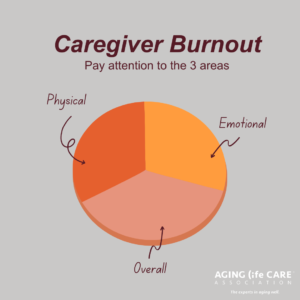ALCA Members feel strongly about helping family caregivers avoid burnout.
With June as Men’s Health Awareness Month we are featuring some of ALCA’s male members who have built a career out of Aging Life Care Management and on male caregivers, who often do not ask for help.
ALCA Board Member, Co-Chair of the President’s Committee, and long-time ALCA member Steve Barlam shares some signs of caregiver burnout, and tips to help family caregivers.
Keep in mind if you see all or some of these signs, it’s important to talk with your doctor, but an Aging Life Care Manger can help caregivers by coordinating care and helping families navigate the aging journey.
Signs of Caregiver Burnout
 |
Physical:
- Confusion/disorganization
- Sleep disturbance
- GI disturbance (stomach aches/diarrhea/constipation)
- Headaches
- Muscle aches – neck/shoulders
- Sexual dysfunction
Emotional:
- Lack of patience
- Sadness
- Overwhelmed
- Social Isolation
- Apathy/disengagement
- Anger/Frustration/Belligerence
Overall:
- Avoiding issues, tasks, people
- Feeling stuck and overwhelmed
- Getting overly involved trying to force a parent to take action in less than appropriate ways
- Building family conflict/tension
|
Identify the early symptoms of stress and exhaustion
It’s important to help people identify where they first feel stress. Where is it in their body?
One family caregiver described it like this: “I feel it in my stomach and as it gets worse, it rises into my chest. I can see how it affects the way I breathe, and finally it rises into my neck and throat, at which time I have a hard time controlling it, and I would shout out.”
So the key here is to pay attention to it when it’s in the stomach and be conscious of it, so that they can adjust the environment, and hopefully avoid the stress rising.
The caregiver continued: “As a young parent, I would sometimes need to bathe my two boys. As soon as I’d get both boys into the tub, one would want to hop out and run around the house. I would get frustrated, and find myself getting stressed out, leading to me raising my voice to get both boys to cooperate. When I finally identified where I felt the stress, I could tell my boys: ‘Daddy is feeling it in his belly…. lets cooperate, so that I don’t need to raise my voice,” and this worked.”
Steps a caregiver can take to reduce the risk of burnout
Like the old adage states, take care of yourself so you can care for others. Just like when air stewards tell parents to put the oxygen mask on first before putting it on their child, you too need to be able to be in good form, so you can care for your family member.
- Acknowledge that the work you do as a caregiver is hard work
- Asking for help is not a sign of weakness
- Building in time in the day/week to take care of yourself (meditation, exercise, sleep, etc…)
- You don’t have to do this caregiving thing all by yourself
- Value of support groups
- Give yourself permission to take a break once in a while
Preventing caregiver burnout from interfering with caregiving duties
Below are some steps you can take to help prevent getting burned out and interfering with your caregiving duties.
- Identifying others that can step in / other family members / others from your faith community (church, synagogue, mosque) / friends
- Delegate even when you know that it won’t be as good as if you would have done it. (Even if it’s not “perfect,” it’s getting done.)
- Identify someone you can talk to – a friend, a confident, a therapist. It doesn’t matter who, but you do need someone.
Remember, if something happens to you, you will not be able to be of any help to yourself nor to the person requiring care. Self care is critical.
One way to reduce the amount of stress – thus improving health – for a caregiver is by working with an Aging Life Care Manager. Through a client-centered, holistic approach, Aging Life Care Managers guide families to the actions and decisions that ensure quality care and an optimal life for those they love, thus reducing worry, stress and time off of work for family. To find an Aging Life Care Professional®, or learn how to become one, learn more at: aginglifecare.org
About the Author:
Steven Barlam, MSW, LCSW, CMC., is CEO role at JFS Care in Los Angeles, which provides quality eldercare solutions for seniors and their involved families including in-home care, and professional coaching/guidance through Care Management Services. His driving motto is, “It has to be good enough for my mom,” as he is all about ensuring quality care experiences for clients and their families. Steve values both tradition and innovation as he leads his team to grow JFS Care’s presence to deliver better care solutions in Los Angeles. Steve has over 30 years experience in the private sector before joining JFS. As a member of ALCA since 1991, Steve was Board of Director’s President in 2003, is currently on the Board of Directors, and serves as Co-Chair of the Chapter President’s Committee.